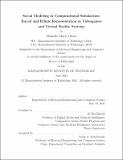Social Modeling in Computational Simulations: Racial and Ethnic Representation in Videogames and Virtual Reality Systems
Author(s)
Olson, Danielle Marie
DownloadThesis PDF (57.22Mb)
Advisor
Harrell, D. Fox
Terms of use
Metadata
Show full item recordAbstract
Computational simulations such as videogames and virtual reality (VR) systems already pervasively attempt to represent aspects of human identity, including modeling race and ethnicity-related phenomena. However, existing strategies typically focus on representing racial and ethnic identity only as graphics-level customizations and often rely on racial stereotypes [222]. Race and ethnicity are tied to social systems,histories, embodied experiences, interpersonal interactions, and discourse [129, 72, 48] which cannot be reduced to solely graphical models. Furthermore, individuals within the same racial or ethnic groups may have a wide range of differences in their racial and ethnic socialization (RES) experiences [113], feelings of commitment and belonging to their group [171], racial ideologies [153], and how they perceive discriminatory racial encounters (DREs) [15]. It is critical to address the shortcomings of racial and ethnic identity representations in virtual systems because they have real-world consequences on human users (e.g., academic outcomes [120, 41], social behavior [188], racial attitudes [88, 25], healthcare outcomes [111]). There are a lack of formal design approaches for creating compelling racial identity representations and models for use in computational simulations that address these shortcomings.
An interactive narrative videogame system called Passage Home was developed through a design-based research collaboration with clinical and community psychology researchers who study racial discrimination and socialization in Black families to reduce racial stress and trauma [13, 14]. The system embeds a computational model informed by the Racial Encounter Coping Appraisal and Socialization Theory (RECAST; [197, 15]) to simulate a DRE between a Black student and her white teacher. Using Passage Home, two user studies were conducted with 110 PreK-12 educators and 60 youth across the U.S. to understand the relationships between participants’ physical-world RES experiences, identity development, and attitudes and their experience and interpretations in the game. Quantitative analyses revealed statistically significant relationships between participants’ RES experiences [113, 12], colorblind racial attitudes [153], and ethnic identity development [185] with their game experiences [115] and narrative interpretations. Qualitative analyses revealed a range in appraisals of and emotional responses to the DRE in the game. Implications, limitations, and future work are discussed.
Computational simulations are powerful socializing agents that influence individuals’ race-related beliefs, values, and attitudes [76]. This dissertation proposes a novel design framework for racial and ethnic identity representation in these systems, whichmaps four themes of RES practices—(1) cultural endorsement of the mainstream, (2) promotion of mistrust, (3) alertness to discrimination and preparation for bias, and (4) cultural pride and legacy appreciation—onto four simulation components—(1) environments, (2) player characters, (3) non-player characters, and (4) content structures. The upshot is a framework featuring 16 novel design strategies, each with prompts for critical reflection [191], examples from existing systems, and theorized consequences of these representations on users based on the RES literature [113]. The framework provides a new tool to aid practitioners in becoming more conscious of the RES practices they are using when developing racial and ethnic identity representations.
Date issued
2021-06Department
Massachusetts Institute of Technology. Department of Electrical Engineering and Computer SciencePublisher
Massachusetts Institute of Technology